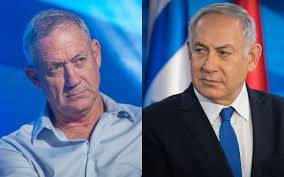A lesson Pakistani political parties can learn from Israel

Stay tuned with 24 News HD Android App

Israel held three elections in a year for its 120-member Knesset (legislature) because no party got the minimum 61 seats on its own or with the support of other parties required to form government.
These elections were held in April, September last year and then on March 2, 2020.
Prime Minister Benjamin Netanyahu’s Likud and Benny Gantz’s Blue and White are the two major rivals. Election after election became unavoidable for the sake of a clear picture, but even repeated efforts failed to bring the desired results.
Benny Gantz during his last election’s campaign had declared that he would not sit in a coalition with Prime Minister Netanyahu because he is facing criminal charges.
But the enormity of the coronavirus has created a situation in the Jewish state that the rivals, burying the hatchet, have now agreed to form an “emergency unity government”.
“We have prevented a fourth election. We’ll protect democracy. We’ll fight coronavirus and care for all Israel’s citizens”, said Gantz after signing an agreement for joining the emergency unity government.
Israel has over 1,300 confirmed corona cases and has had 173 deaths because of the fast-spreading contagion.
Likud and Blue and White are like the PTI and the PML-N because of their adversarial relationship. They have no tolerance for each other. And neither party got involved itself in any foul play to cobble together a majority required to form government.
But a natural calamity – coronavirus - caused the adversaries to forget their bitterness of the past and join hands to meet the requirements of the new situation.
Under the agreement, Netanyahu, in power for the past 11 years, will remain in the driving seat for the first 18 months and Gantz will replace him after that, and this way the Knesset’ three-year term will be apportioned by them.
The two sides have agreed that they will introduce “no new laws that have nothing to do with the coronavirus”.
The agreement has nothing for the Palestinian people, who are struggling for an independent state. They think that the deal between the two Jewish leaders will wreck hopes of pace.
Is not there a lesson in all this for Pakistani parties?
Problems facing Pakistan are far more serious than encountered by the tiny Jewish state.
Everyday opposition parties curse the government for doing or not doing something. They hold the party in power responsible for all miseries of the 220 million people of the Islamic republic.
But, unfortunately, the rulers and the opposition parties are not ready to sit together and find a solution to all problems. Every party regards itself “all-wise”, capable of steering the country through difficult times.
The PTI has been in power for about two years. The PML-N enjoyed three terms and left a number of problems the PTI is having to grapple with. Another opposition party, PPP, has also enjoyed three terms – two by the late Benazir Bhutto, one shared by Syed Yousaf Raza Gilani and Raja Pervaiz Ashraf (with Asif Ali Zardari as president). The term availed by ZA Bhutto is the fourth.
Patriotism demands that the political parties should think more about common man’s problems than their own future. They should agree on forming a unity government to be able to stamp out the coronavirus and deal with a host of consequent problems the country will have to face subsequently.
Once the urgent problems are addressed, the parties can decide on their future course of action. God willing, these parties will get ample chances to rule the country single-handedly. But for the time being all rival forces should evolve a mechanism to join hands and take on urgent problems facing the country.
Let the world see that political leaders of Pakistan are more caring about their people than the Jewish bigwigs have emerged after the latest agreement.
